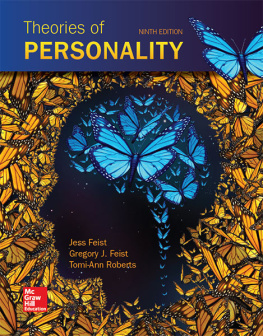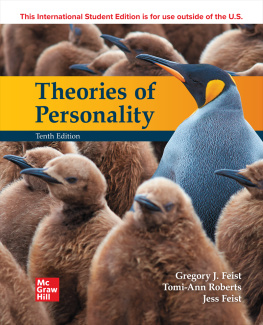Gregory J. Feist - Theories of Personality
Here you can read online Gregory J. Feist - Theories of Personality full text of the book (entire story) in english for free. Download pdf and epub, get meaning, cover and reviews about this ebook. year: 2017, publisher: McGraw-Hill Education, genre: Art. Description of the work, (preface) as well as reviews are available. Best literature library LitArk.com created for fans of good reading and offers a wide selection of genres:
Romance novel
Science fiction
Adventure
Detective
Science
History
Home and family
Prose
Art
Politics
Computer
Non-fiction
Religion
Business
Children
Humor
Choose a favorite category and find really read worthwhile books. Enjoy immersion in the world of imagination, feel the emotions of the characters or learn something new for yourself, make an fascinating discovery.
- Book:Theories of Personality
- Author:
- Publisher:McGraw-Hill Education
- Genre:
- Year:2017
- Rating:5 / 5
- Favourites:Add to favourites
- Your mark:
- 100
- 1
- 2
- 3
- 4
- 5
Theories of Personality: summary, description and annotation
We offer to read an annotation, description, summary or preface (depends on what the author of the book "Theories of Personality" wrote himself). If you haven't found the necessary information about the book — write in the comments, we will try to find it.
Theories of Personality — read online for free the complete book (whole text) full work
Below is the text of the book, divided by pages. System saving the place of the last page read, allows you to conveniently read the book "Theories of Personality" online for free, without having to search again every time where you left off. Put a bookmark, and you can go to the page where you finished reading at any time.
Font size:
Interval:
Bookmark:


THEORIES OF PERSONALITY
Published by McGraw-Hill Education, 2 Penn Plaza, New York, NY 10121. Copyright 2018 by McGraw-Hill Education. All rights reserved. Printed in the United States of America. No part of this publication may be reproduced or distributed in any form or by any means, or stored in a database or retrieval system, without the prior written consent of McGraw-Hill Education, including, but not limited to, in any network or other electronic storage or transmission, or broadcast for distance learning.
Some ancillaries, including electronic and print components, may not be available to customers outside the United States.
This book is printed on acid-free paper.
1 2 3 4 5 6 7 8 9 LCR 21 20 19 18 17
ISBN: 978-1-260-08353-8
MHID: 1-260-08353-5
All credits appearing on page or at the end of the book are considered to be an extension of the copyright page.
The Internet addresses listed in the text were accurate at the time of publication. The inclusion of a website does not indicate an endorsement by the authors or McGraw-Hill Education, and McGraw-Hill Education does not guarantee the accuracy of the information presented at these sites.
mheducation.com/highered
Page iii
Jess Feist was Professor of Psychology at McNeese State University in Lake Charles, Louisiana from 1964 until his death in 2015. Besides coauthoring Theories of Personality, he coauthored with Linda Brannon, Health Psychology: An Introduction to Behavior and Health. He earned his undergraduate degree from St. Mary of the Plains and graduate degrees from Wichita State University and the University of Kansas. His research interest was in early childhood recollections.

Gregory J. Feist is a Professor of Psychology in the Department of Psychology at San Jose State University. He has also taught at the College of William & Mary and University of California, Davis. He received his PhD in personality psychology in 1991 from the University of California at Berkeley and his undergraduate degree in 1985 from the University of MassachusettsAmherst. He is widely published in the psychology of creativity, the psychology of science, and the development of scientific talent. His recent book, The Psychology of Science and the Origins of the Scientific Mind, was awarded the William James Book Award from the American Psychological Association (APA). He is founding president of the International Society for the Psychology of Science & Technology and founding editor-in-chief of the Journal of Psychology of Science & Technology. His research in creativity has been recognized by an Early Career Award from the Division for Psychology of Aesthetics, Creativity and the Arts (Division 10) of APA, and he is former president of Division 10. Finally, he is co-author of Psychology: Perspectives and Connections (McGraw-Hill) with Erika Rosenberg.
Page iv
Tomi-Ann Roberts is a Professor of Psychology at Colorado College. She received her PhD in social and personality psychology in 1990 from Stanford University, and her BA in psychology from Smith College in 1985. Her publications in the areas of gender, personality, and emotion psychology include Objectification Theory, an original theory that has generated a great deal of research into the causes and consequences of the sexual objectification of girls and women. The first paper she co-authored on this topic is the most cited article in the 35-year history of the journal Psychology of Women Quarterly. She served on the American Psychological Associations Task Force on the Sexualization of Girls, is coauthor of the Sexualization of Girls and Girlhood: Causes, Consequences and Resistance (2012), and continues to work on empirical research, applied consulting work, and media efforts in this area. In addition to her teaching in both psychology and gender studies at Colorado College, she currently serves on the executive committee of APAs Division 35, chairs a Task Force on Educating Through Feminist Research, and is a certified Laughter Yoga Leader.
Page vPage vi
Page vii
Page viii
Page ix
Page x
Page xi
Page xii
Page xiii
Page xiv
Page xv
 Page xvi
Page xvi What makes people behave as they do? Are people ordinarily aware of what they are doing, or are their behaviors the result of hidden, unconscious motives? Are some people naturally good and others basically evil? Or do all people have potential to be either good or evil? Is human conduct largely a product of nature, or is it shaped mostly by environmental influences? Can people freely choose to mold their personality, or are their lives determined by forces beyond their control? Are people best described by their similarities, or is uniqueness the dominant characteristic of humans? What causes some people to develop disordered personalities whereas others seem to grow toward psychological health?
These questions have been asked and debated by philosophers, scholars, and religious thinkers for several thousand years; but most of these discussions were based on personal opinions that were colored by political, economic, religious, and social considerations. Then, near the end of the 19th century, some progress was made in humanitys ability to organize, explain, and predict its own actions. The emergence of psychology as the scientific study of human behavior marked the beginning of a more systematic approach to the study of human personality.
Early personality theorists, such as Sigmund Freud, Alfred Adler, and Carl Jung, relied mostly on clinical observations to construct models of human behavior. Although their data were more systematic and reliable than those of earlier observers, these theorists continued to rely on their own individualized way of looking at things, and thus they arrived at different conceptions of the nature of humanity.
Later personality theorists tended to use more empirical studies to learn about human behavior. These theorists developed tentative models, tested hypotheses, and then reformulated their models. In other words, they applied the tools of scientific inquiry and scientific theory to the area of human personality. Science, of course, is not divorced from speculation, imagination, and creativity, all of which are needed to formulate theories. Each of the personality theorists discussed in this book has evolved a theory based both on empirical observations and on imaginative speculation. Moreover, each theory is a reflection of the personality of its creator.
Thus, the different theories discussed in these pages are a reflection of the unique cultural background, family experiences, and professional training of their originators. The usefulness of each theory, however, is not evaluated on the personality of its author but on its ability to (1) generate research, (2) offer itself to falsification, (3) integrate existing empirical knowledge, and (4) suggest practical answers to everyday problems. Therefore, we evaluate each of the theories discussed in this book on the basis of these four criteria as well as on (5) its internal consistency and (6) its simplicity. In addition, some personality theories have fertilized other fields, such as sociology, education, psychotherapy, advertising, management, mythology, counseling, art, literature, and religion.
Font size:
Interval:
Bookmark:
Similar books «Theories of Personality»
Look at similar books to Theories of Personality. We have selected literature similar in name and meaning in the hope of providing readers with more options to find new, interesting, not yet read works.
Discussion, reviews of the book Theories of Personality and just readers' own opinions. Leave your comments, write what you think about the work, its meaning or the main characters. Specify what exactly you liked and what you didn't like, and why you think so.











